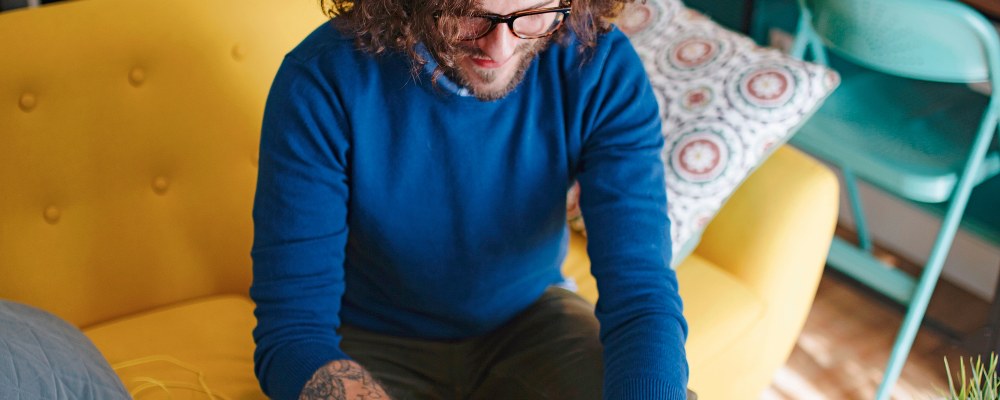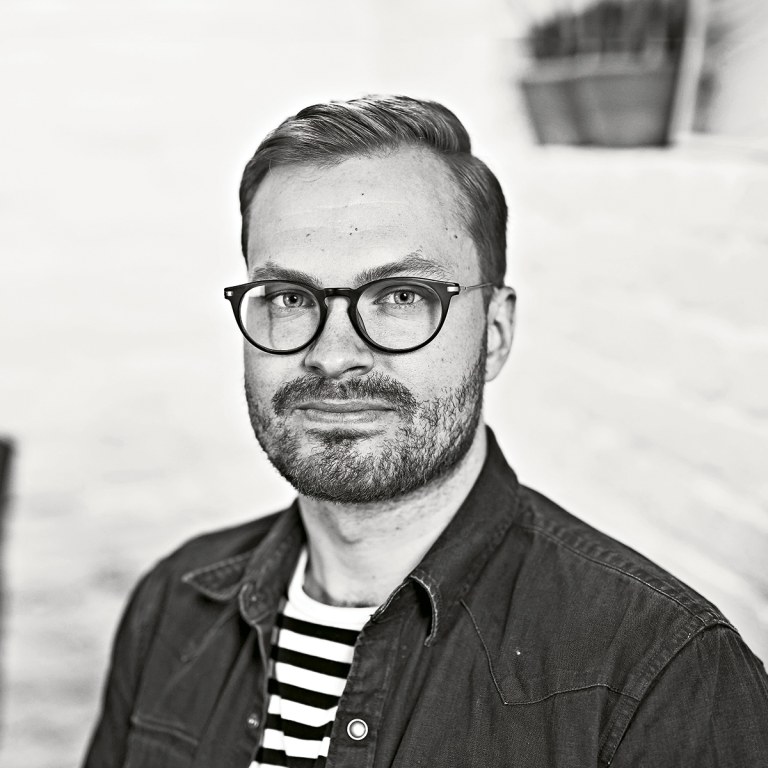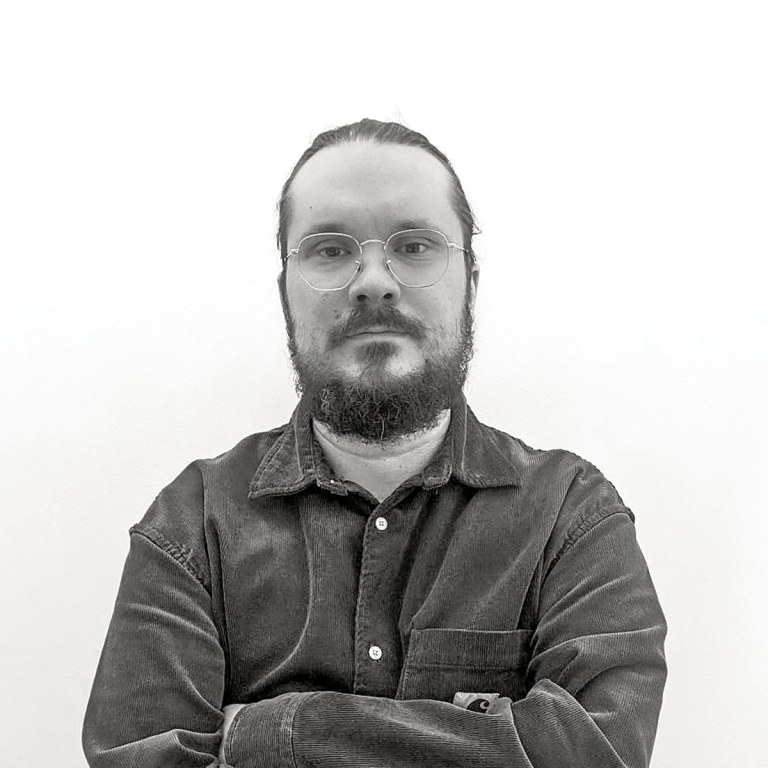
A man's value is determined in the market: a man is what he does and how much money he earns. This is how Samuli Hietala sums up the prevailing attitude in our culture and immediately adds that this instrumental notion of an ideal man is both narrow and problematic.
Hietala runs the MiehenTila project at Nyyti ry, an organisation that promotes the mental health and study ability of students. The Academic Engineers and Architects in Finland TEK has been working in cooperation with Nyyti, because the well-being of students is also a top priority for TEK. In spring 2021, TEK donated 125 000 euros to Nyyti. With this sum, TEK and Nyyti implemented MielenTEKoja, a project that provided support for students’ mental health in the academic year 2021–2022.
The MiehenTila project is run in Finnish, but Nyyti offers a range of services in English as well, read more at the end of the article.
“The idea of what a Finnish man should be like can, at times, be tough and faceless. As such, this ideal notion creates a lot of pressure for men,” says Hietala. Prior to Nyyti, he worked at Väestöliitto, the Family Federation of Finland, specialising in the well-being of boys and men.
MiehenTila provides free individual guidance and peer support in the form of group chats for men and those identifying as male who are studying in higher education. Atte Rimppi is working in the project as a specialist and is responsible for group activities. According to Rimppi, manhood is associated with an idealised image of a man who can stand the pressure and is even ready to use and to tolerate violence.
“We talk a lot about what it means to be a man in our groups. Although manhood may not be a big part of the group members’ identity, the world still perceives them as men,” says Rimppi.
The MiehenTila group activities have produced some promising results. Rimppi measures the groups’ achievements using the Experiences of Social Inclusion Scale of the Finnish Institute for Health and Welfare and the Warwick Edinburgh Mental Well-Being Scale. The peer groups meet once a week for two hours at a time over the course of eight weeks. The participants feel that, as a result of this process, their mental health has improved by 13–20 per cent.
“It is worth noting that the initial level of well-being of the men participating in our groups is often lower compared to the average man studying in higher education. That is the unfortunate starting point when working with men. They rarely seek help for minor challenges,” says Rimppi.
“When you’re working specifically with men, it's always crisis work,” Hietala adds.
Hietala says that there is a gender bias in seeking help. For example, only 29 per cent of the students who used the services of the Finnish Student Health Service FSHS in 2020 were men. Mental Health Finland reported last year that only one in three callers to its Crisis Helpline are men.
“These numbers do not reflect the actual need for help, but the dynamics of seeking help. Men are overrepresented in suicide and substance abuse statistics, for example. It is typical for men to be conspicuous by their absence from the debate on well-being.”

Hietala notes that some men do not feel comfortable with channels of assistance that are open for all. Because of this, many services and groups emphasise their target group in their name, which often refers specifically to men or boys: MiehenTila, Mies+, Jäbät ja tunteet, Miessakit, Poikien Talo. A third of the participants of the MiehenTila groups, for example, stated that the groups are their first mental health support channel.
“The fact that we provide support for a specific target group is nobody's loss. When someone joins the MiehenTila groups or seeks individual guidance, we often start by telling them that they are worthy of help,” says Hietala.
School bullying has far-reaching effects
A wide range of things can pose a risk to men’s mental health: loneliness, the ideal of dealing with things on your own, a lack of self-confidence, the relationship with one’s parents, pressure to perform and significant relationships or a lack thereof. According to Atte Rimppi, these are the most common topics that come up both in the MiehenTila group chats and the questionnaire “How are you, young men?”, conducted by Nyyti in 2020.
The help that is available to men, such as appointments with the student welfare services or free chats, are mostly one-to-one services. Samuli Hietala believes that some of the biased beliefs that concern assumed males and are produced by our culture are in fact easier to deconstruct when discussing them with peers.
According to a study by Nyyti, men find it hard to talk about feelings with each other. Nyyti wanted to address this mismatch by setting up a peer support channel, the MiehenTila group chats. Rimppi says that group members have found it easier to talk to people they do not know: they do not need to worry about burdening someone else too much with their problems.
“Peers can provide understanding, shared experiences and empathy. The experiences of others can help you put your own problems into words. It’s valuable to realize that you’re not alone with your problems. When you start talking, you’re not burdening anyone else, but simply unburdening yourself to feel lighter,” says Rimppi.

A major cause of men’s mental health issues is school bullying. Rimppi says he was surprised to learn just how common bullying experiences are among men. There have been 12 MiehenTila groups so far, and up to 40–70 per cent of the participants have been bullied at school.
“Some pretty damn severe cases! Some of the men have talked about their bullying experiences in therapy, but there are also those in our groups who are sharing their experiences for the first time.”
Rimppi says that school bullying has far-reaching effects – extending well into adulthood. Bullying can create pressure to perform and cause a lack of self-confidence and difficulties in social situations. Some of the group members have found it difficult to believe that others want good things for them. Some feel that others are with them only out of pity. There are those who fear rejection or getting hurt so much that they avoid social situations altogether. Some want to prove to their bullies that they are worthy, so they overachieve in their studies, work or sports.
“Many are disappointed by how poorly their school dealt with the bullying,” says Rimppi.
Being your own kind of man
MiehenTila chats are held in Finnish online, in groups of about ten people, and you can participate no matter where in Finland you are. Hietala says that many participants come from Southern Finland, but there have been some men from regions like Kainuu and Lapland as well.
“I know of at least three WhatsApp groups that have been set up on the basis of our groups. One time we had a lot of men from Jyväskylä in the same group. They even agreed to meet live in Yläkaupunki,” says Rimppi happily.
Last year, Hietala joined forces with others in the field to set up a network of partners working specifically with men. The network aims to work together to change the current debate on men's mental health and to expand the role of men. Hietala mentions that a key tool in this work are positive role models and peer stories. When ordinary men talk about their challenges, young people realize that they are not alone with their issues.
“There’s no need to wear matching T-shirts, but everyone can represent manhood in whatever way they want. It’s touching to meet former group participants who have managed to escape the demands of manhood. Nobody needs to be a certain type of man, but you can choose your way of being a man again and again,” says Hietala.
He is currently compiling a self-help tool for men on the website of Nyyti ry. The idea of the tool is to pass on experiential knowledge from men to men and to reduce the shame associated with mental health problems, which can prevent people from seeking help.
Learn more about the MiehenTila project (in Finnish): www.miehentila.fi
Nyyti's services in English:
Monthly chats on Tuesday at 18-20
Further reading: I’m concerned about our boys
Starting university is the start of something new
According to psychologist Samuli Shintami, starting university can often be stressful, because while your studies become more demanding, your personal support networks diminish.
“There are a lot of changes in life all at once. Many young people move away from home and everything suddenly becomes their responsibility: the management of finances, bills, food. They may have left their childhood friends back home and have not yet made any new friends in school. University requires much more self-direction than upper secondary school,” Shintami says.
“When a person gets excited, they easily try to do too much. It may be hard to recognise the limits of your capacity. Someone who knows you well can notice that you’re getting tired even before you realize it yourself."
Shintami lists some of the signs that your energy levels are being drained: tiredness, wanting to cancel appointments more often than before, losing your temper more easily than before, trouble concentrating, waking up in the middle of the night, difficulty getting started with things and not experiencing joy in doing things that you used to enjoy.
“Short-term stress can even give you an energy boost, but if you’re constantly exhausting your energy over a long period of time, this will eventually lead to burnout.”
Shintami has a piece of advice to share: if you notice you are getting stressed, stop. Add something in your daily routine that helps you recover and decide how you will use your limited resources. Ask for help.
“We humans sometimes feel mentally unwell and that’s a part of life. But if that bad feeling does not go away, don't hesitate to bring it up with your family and friends or a professional.”
Shintami is the host of the new MielenTEKoja well-being podcast (in Finnish) for students. The podcast is produced by the Academic Engineers and Architects in Finland TEK and Heltti. One of the visitors in the six episodes of the podcast is psychotherapist Ville Merinen, known on social media as terapeuttiville. The themes of the podcast include getting things done and FOMO, the fear of missing out. Read more.